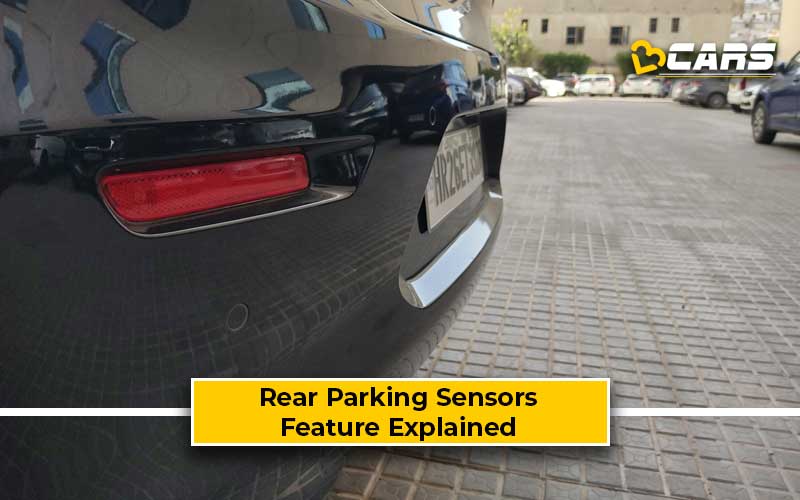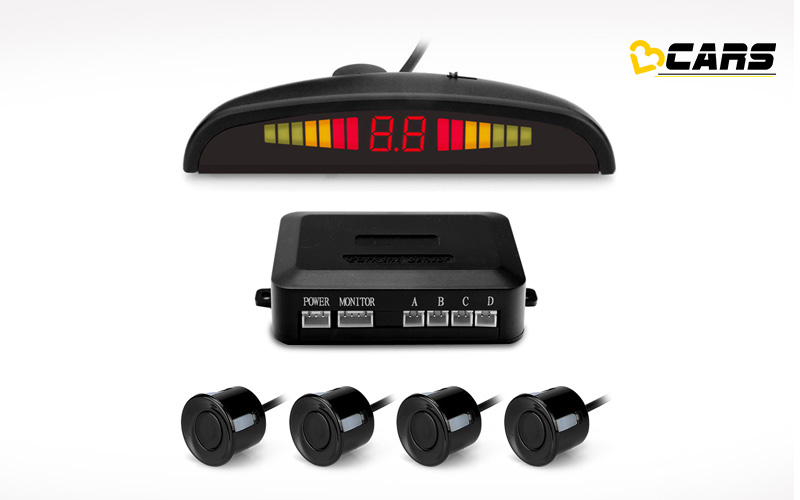Rear Parking Sensors - Detailed Feature Explained | V3Cars
In this Feature Explained article, we’ll present the most detailed analysis of the rear parking sensors in your car. We’ll list out the pros and cons, explain how it works, provide the typical cost of getting rear parking sensors from the aftermarket, and repair and replacement costs of rear parking sensors. Based on this analysis, we’ll suggest if you should add this feature to your car or skip it.

What Are The Pros And Cons Of Rear Parking Sensors?
The pros, or advantages, of rear parking sensors are:
- Minimises chances of scratches or bumps while reversing
- Makes parallel parking easy
- Makes reversing into a tight spot easy
The shortcomings, or issues, of rear parking sensors are:
- Parking sensors ruin the look of a car to some extent
- If you have to replace the sensor, then you will most likely need colour-matched sensors
- Electromagnetic parking sensors are expensive to repair or replace although they’re rare in mass market cars
What Are Rear Parking Sensors?
Rear parking sensors are small devices that are located on the rear bumper of a car. Rear parking sensors measure the proximity to objects at the back of your car and warn the driver via audible beeps. The beeping tone gets faster and more frequent as you get closer to the object or obstacle behind you. In short, rear parking sensors locate objects or obstacles that the driver cannot view from the inside rearview mirror, or IRVM.
How Do Rear Parking Sensors Work?
There are two types of rear parking sensors in the market currently - ultrasonic sensors and electromagnetic sensors. Ultrasonic rear parking sensors make use of sound echo to detect and calculate the distance between the car and other objects. These sensors are placed on the rear bumper of the car to ensure that acoustic waves can travel uninterrupted. Ultrasonic rear parking sensors alert the driver of any object or obstacle by emitting audible beeps inside the cabin. The frequency of the beeps increases as you get closer to the object or obstacle behind you. Ultrasonic rear parking sensors may not be able to detect flat or small objects. Hence, you must not rely on them entirely for your parking needs. Some cars also have an accompanying display to give you a rough idea about how much more you can reverse.
Electromagnetic rear parking sensors, on the other hand, emit an electromagnetic field to detect objects at the rear of the car. These sensors can be placed inside the bumper of the car. Thus, you won’t need to drill holes in the rear bumper like with the case of ultrasonic rear parking sensors.
How Expensive Is It To Repair Or Replace Rear Parking Sensors?
The cost of repairing or replacing the rear parking sensors on a car varies based on the manufacturer. Thanks to updated safety regulations in India, all new cars sold in the country get rear parking sensors as standard. While most budget hatchbacks, such as the Celerio, get two sensors at the back, some have 4 or more sensors. If you’ve damaged a sensor or two, it will cost you Rs. 2,000 or more to replace them. However, some manufacturers require you to replace the entire array of sensors and the wiring in the case of a damaged sensor. This could set you back by Rs. 8,000 or more depending on the model.

What Is The Cost Of Aftermarket Rear Parking Sensors?
The most basic aftermarket rear parking sensors typically cost as little as Rs. 650 at most car accessories shops or online retailers. Labour costs for installing could add another Rs. 500 or so to the cost. Mandating this feature has really helped bring down the cost of the sensors as production scaled up.
How Easy Or Complex Is It To Install Aftermarket Rear Parking Sensors?
Based on the type of system, it can be really easy or super difficult to install rear parking sensors on your car. To install aftermarket rear parking sensors, you will need to drill holes into the rear bumper, install the sensors and then route the wiring properly. Hence, it is best to leave this job to a professional. An important thing to remember while shopping for aftermarket sensors is to find ones that match your car’s bumpers colour.
What Cars Get Rear Parking Sensors From The Factory?
Since July 1, 2019, a government regulation requires all new cars to have a rear parking sensor or parking camera as standard. Back in 2017, the Ministry of Road Transport and Highways proposed several changes to make our roads safer. Key among them was making dual airbags, rear parking sensors and seatbelt reminders mandatory for all new cars on sale from July 1, 2019.
Verdict - Should I Get Aftermarket Rear Parking Sensors?
If you bought a brand new car after July 1, 2019, the chances are it already has rear parking sensors. However, if you own an older car, we highly recommend this feature. Aftermarket rear parking sensors are not only affordable but also quite easy to install. They enhance your ownership experience by making parking in tight spots easier.
Note: Check your Car EMI with our - Car Loan EMI Calculator
You can use our Fuel Cost Calculator to see how much any petrol, diesel or CNG car will cost to run based on the latest fuel price in your city.


0 Comments